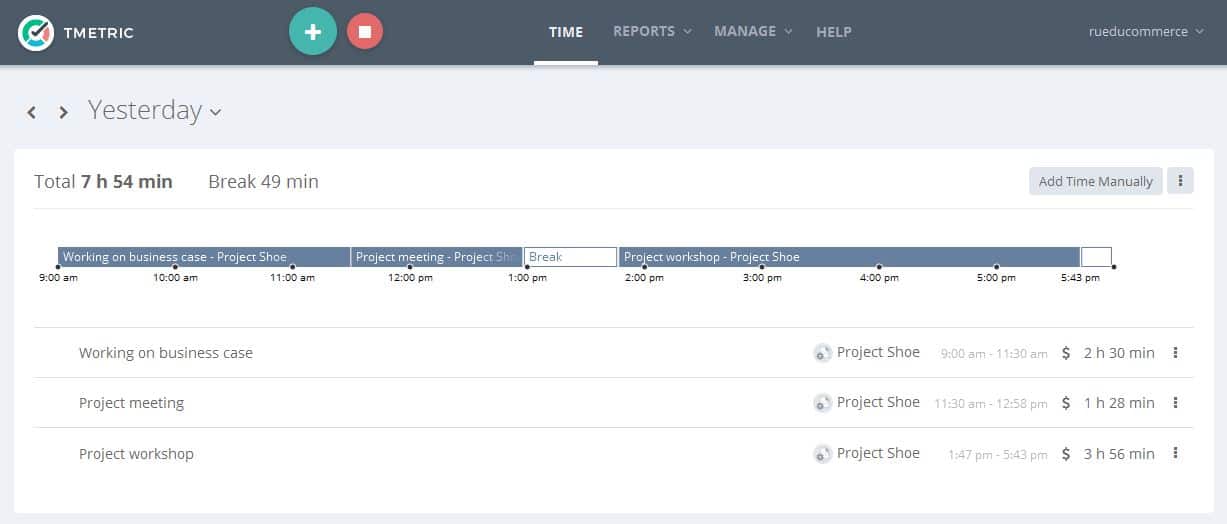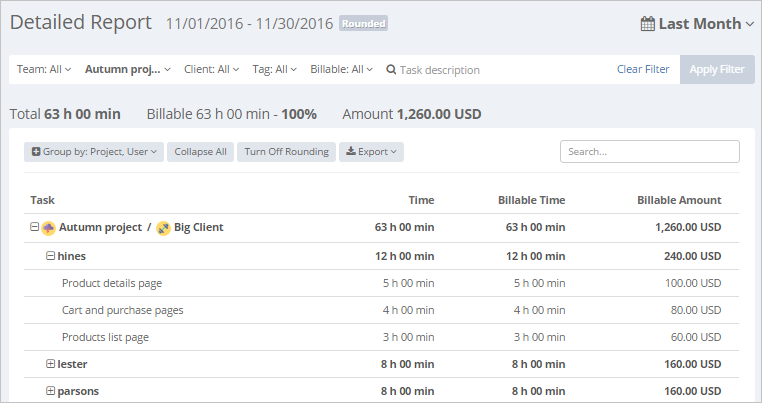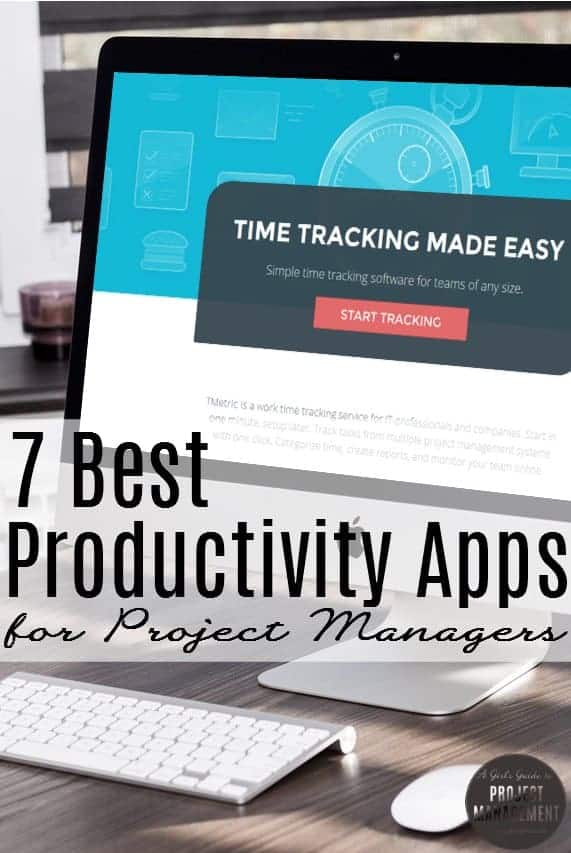7 Best Productivity Apps For Project Managers
This blog is reader-supported. When you purchase something through an affiliate link on this site, I may earn some coffee money. Thanks! Learn more.
I’m pleased to be working with Devart, the company behind TMetric, to bring you this sponsored article. All opinions are my own.
There are simply not enough hours in the day to get everything done that I want to.
I can’t add more hours, so I’m always on the lookout for productivity shortcuts and tools that will help. My basic three-step productivity approach is:
- Prioritise
- Delegate
- JFDI
But once I’ve got through that I still need some tech to help me stay organised. Here are 7 of the best productivity apps for project managers.
1. Taskworld
Productivity starts with knowing what it is you have to do. Personally, I love lists. Taskworld is good at lists, plus you can view your book in Kanban style if you prefer that.
The other feature that particularly warrants calling out is enterprise messaging. This might seem like a small thing, but there are security implications for using ‘ordinary’ Skype (Skype for Business is a better enterprise choice, but expensive).
Having a solution that gives you secure enterprise messaging in a way that’s a bit more organised than your company’s Slack channel is good for productivity.
2. Trello
Trello is the tool I recommended last year when I was giving a guest lecturer at the Institute of Contemporary Music Production. The students aren’t project managers but they do have to manage projects, and later in their careers they’ll be handling big budget projects so the need tools that will grow with them and yet be simple to use.
It doesn’t have as many features as Taskworld. For example, it doesn’t have recurring tasks or list view and it has lower storage limits, but for teams that want a tool to help them get started quickly it’s a good fit.
If you want to track how long tasks are taking you, it integrates with TMetric (see number 5 below) to help you do just that.
3. Cardsmith
I interviewed Monica Borrell from Cardsmith last year for the Inspiring Women in PM series and I remain impressed with Cardsmith as a tool for brainstorming and organising your thoughts. It works like a white board and sticky note. I love how you can arrange the notes in order, or not. Depending on how you prefer to work.
I have seen great boards created where the steps are organised by process (move along the process as you progress in the work) and also those organised by theme (all similar tasks together in one chunk, regardless of process step). It’s very flexible for sorting out your tasks, steps and thoughts.
4. iMindQ
I’m a little biased about iMindQ because I have worked with the team there and used their tools for years now. But I wouldn’t recommend it if I didn’t think it was worth it.
If your brain doesn’t work in lists or sticky notes, then iMindQ’s mindmapping tool is worth looking at. They have an online version which is free and has built-in image search, the ability to add links and notes to topics and other cool stuff. Plus it has templates so you never have start from scratch. (I do normally start from scratch though, it just gives me more flexibility.)
Right, on to tools to help you do things after you’ve worked out the tasks involved.
5. TMetric
TMetric is a time tracking app that integrates with other project management tools to record hours spent as you are doing the work. The online version is free for up to 5 team members. I like how you can see your day as a timeline, which is perfect for people who think visually (“What was I doing before lunch? Ah, I remember…”). Although it is slightly disconcerting that when I first logged in it defaulted to my work day starting at 5am.

It’s very quick to set up new projects and tasks and set rates for billable hours if that’s important to you. It’s also got the feature to add a budget per project so you can then track actuals against the budget. The downside here is that you only get an email alert if the project goes over budget so you’ll have to keep on top of the reports to see how the work is progressing.
Combined with your scheduling tool, TMetric is a good way to get real productivity data about how your team is using their time. It’s easy too, so you don’t have to spend long learning how to use it and it integrates with JIRA, Wrike and others (like Trello, which I mentioned above).

6. Slack
I know I implied earlier that Slack wasn’t great for organised chat, and I do believe that. However, there are moments when for productivity’s sake while you are doing the work all you need is a constant flow of comments and the ability to quickly share attachments and links.
Conferences, launches, busy times; any time when your team needs to stay in virtually constant contact would be perfect for Slack. Otherwise (in my view) the channels can get a little stagnant and if there isn’t the traffic, you’ll find people move away from it.
7. Redmine
I have used Redmine for issue tracking on software projects and I loved it. So, so easy. Redmine is hard to beat when you need to blast through a list of bugs or get problems out of your head and into a log. I also didn’t know it integrated with TMetric until I started researching this article.
You do need to have someone responsible for the admin and set up of Redmine though as it is an open source tool (i.e. free!) that you have to download and configure yourself. The benefits of this are that you can add new fields if you need them so that your lists and logs work perfectly for your needs. The downside is that it’s extra work for someone in the company, above and beyond what you’d get from a Software as a Service, hosted cloud option.
One thing I have found through trying out lots of different tools over the years (you can see all my software reviews here) is that everyone has different needs. What boosts my productivity doesn’t work for everyone else, so my top tip for finding a productivity tool that is going to work for your team is to try some out.
Find out how your team works (you know already, right?). Some environments are going to love Slack. Others will find it virtually impossible to implement. Huddle doesn’t do it for me but I know a project team that couldn’t live without it.
Full-suite Project Management Tools
There are lots of feature-rich project management tools that serve the whole project life cycle. They do help productivity, obviously, because they help you store all project information in one place, manage your plans, track status and more.
I’m often asked to recommend tools and it’s hard, because if you’re going to invest in an enterprise project management solution it has to be a perfect fit for your workflows and teams (or you have to be prepared to compromise or move to best practices). There isn’t one-size-fits-all or there wouldn’t be so much competition in the marketplace for project management software.
Here are some that I have tested and think are worth looking at:
- LiquidPlanner*
- TeamWork PM (this is the one I use with my team)
- Wrike (I haven’t looked at this for a while but it’s constantly in the ‘top product’ lists)
- Genius Project
I know that productivity and tools are personal choices. What do you use to help you stay at your most productive? Let us know in the comments!
*This article contains affiliate links. If you purchase anything I recommend it’s likely that I’ll receive a small affiliate compensation. I only recommend tools and books that I can personally vouch for.

